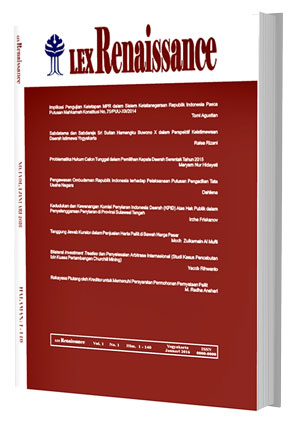Main Article Content
Abstract
Abstract
Problems in the study: first, the dualism of authority checks Notary alleged violations of the code of
conduct? Second, the authority checks the code of conduct by the Regional Supervisory Council based
on the code of ethics? This research is empirical jurisdiction. The study concluded, first, the Regional
Supervisory Council and the WCA Board may conduct an examination of the alleged violations of the
code etik Notaris. Regional Supervisory Council code etik Notaris checks if the report from the public
and there is also a certain criteria of Notaries code violations that can be checked by the Supervisory
Council of Regions. Honorary Board area is not just waiting for reports received, but can process it if it
finds violations of the code of conduct, if the Honorary Board of the Regional found violations of the
Code, the Honor Council will call a notary in question to be fostered, because the function of the
Honorary Council of Regions in addition to overseeing the code of conduct, there is pembianaan also
against the Notary. Code violations that have been reported to the Regional Supervisory Council can
not be diverted report to the Council of Honor, and vice versa. Secondly, the provision of the code of
conduct by the inspection authority Regional Supervisory Council is not in accordance with the
characteristics of the code of professional conduct.
Keywords: Regional Supervisory Council, Notary.
Article Details
Authors who publish with this journal agree to the following terms:
a. Authors retain copyright and grant the journal right of first publication with the work simultaneously licensed under a Creative Commons Attribution License that allows others to share the work with an acknowledgement of the work's authorship and initial publication in this journal.
b. Authors are able to enter into separate, additional contractual arrangements for the non-exclusive distribution of the journal's published version of the work (e.g., post it to an institutional repository or publish it in a book), with an acknowledgement of its initial publication in this journal.
c. Authors are permitted and encouraged to post their work online (e.g., in institutional repositories or on their website) prior to and during the submission process, as it can lead to productive exchanges, as well as earlier and greater citation of published work (See The Effect of Open Access).



